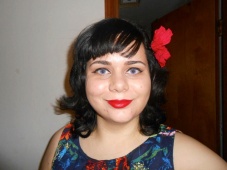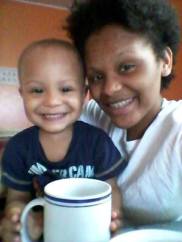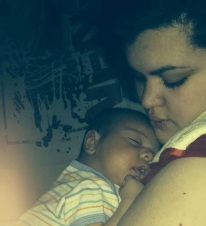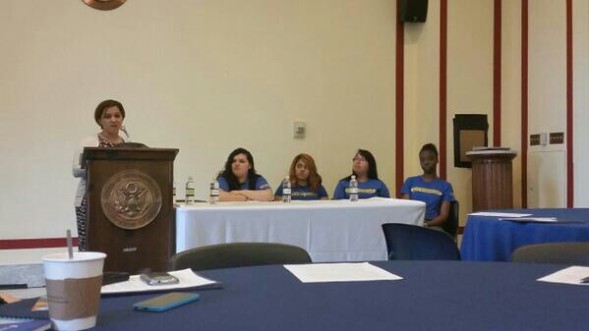By Javi Infante
When I found out I was pregnant I was nine weeks along, and in a new relationship with someone who was not the father of my baby. My boyfriend had just arrived from his three-month boot camp with the Marine Corps, we had been in love years back and reconnected after he got home. This was finally our chance to be happy together. But that’s not how things turned out.
At 20 years old, I was scared, but excitedly anticipated the arrival of this baby, even as it was a baby that had been conceived too late into the relationship between his father and I. I was mentally and emotionally way out of that loop, but I stuck it out because I had always wanted to be a mother and figured I knew this guy enough (we had been together for one and a half years) to let him be the father of my first baby. I thought, “Everything always works out for the better,” but until that moment I hadn’t learned what that really meant.
My pregnancy was a dream. I never felt sick, except for when cashews and scrambled eggs were near me. I slept for hours on end face down until about 20 weeks (five months) of gestation because that’s when I started to show. I loved rubbing my belly, running my fingertips in circles, already loving what was in my growing womb, feeling him move. I thought how lucky I was to finally meet my son that August in 2008 while I endured an unbearably hot summer. At 39 weeks, his father, my mom, and I checked into Valley Presbyterian Hospital to have my cesarean section. The doctor had told me in order to save me the possible pain from my hip dislocation, his best bet was to cut me open instead of risking having my hips add on pain while birthing my son.
My Marine boyfriend was long gone because I chose to not be taken care of by him and have to lie to my son about who his real father was. He had tried to be compassionate, and offered to pay for an abortion to get rid of this thing that stood between us and our happiness. I declined. He offered to take care of me with the condition to never tell the baby that his biological father even existed, he wanted to take over completely, but something didn’t feel right about that and we broke up. That’s entirely another story to tell.
After my epidural, I felt everything go fast. I was just another patient in the doctor and nurses’ busy schedules. I felt myself slowly decline from then. They had to connect oxygen tubes through my nose as it got harder for me to breathe, they kept on pulling me side to side, everything was numb from the waist down, but I felt the pressure. After a few minutes, I heard what sounded to me like the loud meow of a kitten, high-pitched and catching up to his lungs. His father brought him over, wrapped in the hospital’s blanket and a beanie.
Paolo looked pink, and too pretty to be a newborn, his eyes learning to open. The nurses took him, and moved me quickly to the recovery room. The numbness began to leave my body, I started to feel my abdomen hurt, swollen, bruised, it was a stapled wound. What was once stretched out 43 inches around my core was now flat, like a deflated balloon. Soreness ran from my center all through my body. I cried. Still drugged, I attempted to stretch my hand for someone to hold me, but there was no one who understood my pain.
I continued to feel the physical pain from surgery for a good two months after. My sleep pattern had changed drastically. My breasts were heavy with milk, but also sore and hot. Paolo wouldn’t latch onto me, he wasn’t drinking my milk, and it was accumulating. He cried. I cried. I woke up every two hours to feed him, and rock him back to sleep. I had difficulty getting up, moving around, laughing, being myself. I felt different, there was nothing left of who I was just months ago. I was unhappy. I wasn’t enjoying anything of this new stage in my life. I felt out of place, like I didn’t belong. I felt I had wished for something that was granted to me, but then realized I didn’t want it.
I wanted to sleep and not look at my scarred and stretch-marked stomach, slip in my jeans and escape to the beach, but I couldn’t. Every day for three years I wanted to run away from this, from motherhood, from this anchoring sense of entrapment. Holding my son did not fulfill me. I thought of a million other things I could be doing except this. Yet, I had to be there. I would talk myself out of the ‘I wanna be free’ thoughts. I had to pull through somehow. This looked like post-partum depression.
When Paolo was nine months old his father and I split. I felt relieved, free again. I had not factored in that I was undocumented, a single mother, and a student. Everything started building up too quickly and came tumbling down on me. I moved in with my boss at the time, another single mother who had a stable financial situation. But within a few days of moving in, she sat me down to tell me that she realized that she had overextended herself by inviting me to move in, that she was cutting my salary down from $1,200 to $400 a month because I was living there with my son and she was paying for rent and bills. My car had stopped working. I was unable to move around, I couldn’t move out and get another job because she did not trust anyone else with her son and I didn’t have another contact to lead me to a new job. I felt trapped yet again, it had to be a nightmare.
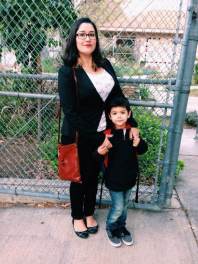
I went through these obstacles while living with post-partum depression. I fell deeper into a sense of helplessness. I had gotten used to sleeping four to five hours a night. Paolo wasn’t eating right, I was sharing living space with someone who did not want me or my son around. I had to hold on to him. I had to dig within myself and find the mother I could be. She had always been there, where was she now? I cried almost every night. I stopped caring about what I wore. I lived to care for the babies at home. I became very attached to my son, and understood it wasn’t his fault. But I felt alone. It was hard for me to see a way out. I would bring myself down and ask the same questions. ‘If only I had papers. If only I had chosen to be with the right guy. If only I had not gotten myself into so much shit.’ The questioning was never ending.
Eventually, I left that house. I moved back to my mom’s place. I was without a job for some time. In school I heard about undocumented students gathering to advocate for the DREAM Act which was going to come up for a vote and would give us papers if it passed. I joined the club at school, and quickly became one of its officers. We began to join the actions taking place in downtown L.A. with other groups that had formed. I connected with other undocumented youth, and for the first time I felt that I belonged. They had all gone through difficulties as a result of not having papers.
I had been student body president in high school, I was chosen “most likely to succeed” by our class, had been accepted into a four-year college that I declined because I had no clue about what resources were available to me. College had always been a dream for me. And so, meeting people who felt the same way gave me a sense of belonging. We were together advocating for our own rights, and hope held us together. I had never felt so identified with another group in my life. I had always been sort of an outcast. I felt inspired by their stories, by the efforts to raise our issues at a national level. I devoted myself to building a movement in my area.
I founded the San Fernando Valley Dream Team in January of 2011, and worked as if I was getting paid for it (I wasn’t). I found purpose in this work. I met people that became my friends, and still are. The undocumented immigrant youth movement saved me from depression. It gave me a sense of validation. It took me out of that emotional shithole I was in. Slowly, I bloomed.
I met amazing people through advocating, people that connected me to other people for job opportunities. I gained a greater sense of identity, embraced motherhood and tapped into my power to influence my son’s life. Paolo is a loving and kind five-year-old boy who teaches me 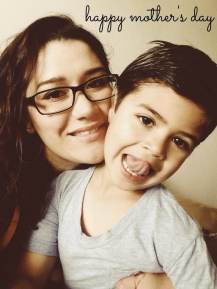 compassion on a daily basis. He has been the closest experience to a miracle for me. I have learned to love me through loving him. His father left the country two years ago and never calls or helps financially. I’ve had a steady job for over two years now which allowed me to move out on my own. I went back to school last semester. I am applying to transfer in the fall.
compassion on a daily basis. He has been the closest experience to a miracle for me. I have learned to love me through loving him. His father left the country two years ago and never calls or helps financially. I’ve had a steady job for over two years now which allowed me to move out on my own. I went back to school last semester. I am applying to transfer in the fall.
I learned that life is a process of overcoming obstacles the best way we can. Sometimes we don’t have the tools to do this, but finding community and support can be a catalyst for our own change and our becoming happier, better people. I am proud to say that I am an undocumented single mother who has learned to navigate a system that was never meant to help me thrive, yet here I am, living by my own rules.
Read Full Post »


